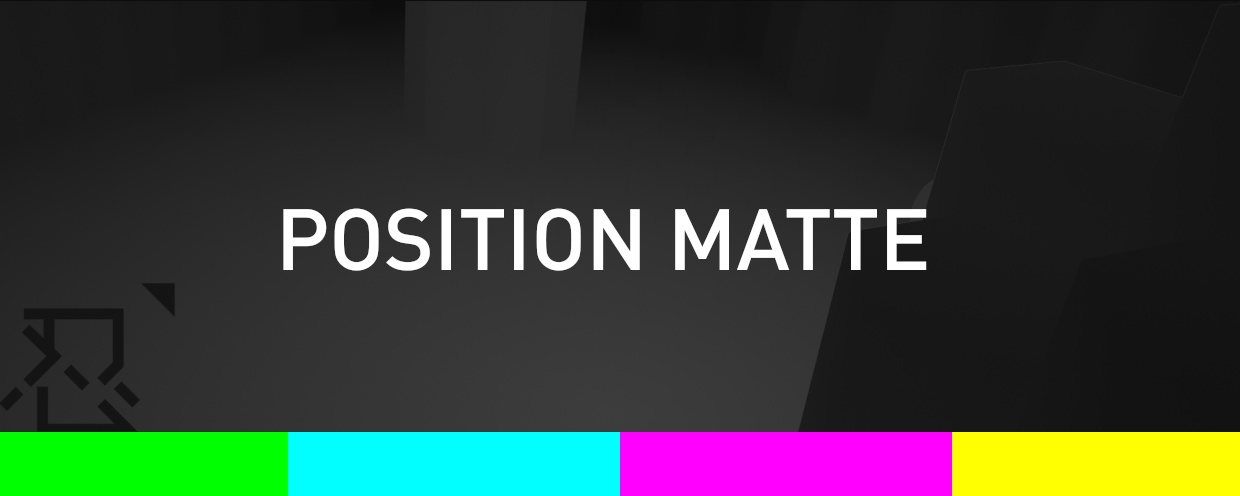Position Matte
-
 Position Matte
Position Matte
Position Matte is a powerful compositing tool that allows for the simple creation of mattes based on 3D Position Passes. This means more flexibility, less matte passes required and far less roto.
https://aescripts.com/position-matte/
Categories
- All Discussions2.3K
- General407
- Product Discussions1.8K

Vladan.
first I haven't worked with the plug in yet so I'm not 100% sure but I guess transparency is tricky (as it always is when doing multi pass comping). If I recall it right does the PPass not see through things as it just "fires rays out" and recognizes the underlaying geo.
What might work is rendering it in 2 steps: 1. without the glass elemts and 2. with the glass objects and getting those PPasses. You might have to render several times the Pass with the glass objects and disabling one at a time (starting with the nearest to the cam). After that you might be able to comp behind the glass objects. You probably have to recreate the refraction for those elements you want to put into the scene manually in AE/Nuke using the Bulge Effect or something similar.
At least in theorie this should work but I would have to test it myself :-)
@Matt: in C4d we have different options to output the PPass. I assume World Space is the one that works with the Plug in or am I wrong?
The other trick I have used is to render with Vray and set your refractive material to "Affect all channels". That way it will refract position data as well. This will also work for ZDepth or any other data pass.
So you can either use the matte colour picker to set the matte position to your object, or zero out your Element world coordinates.
Hi matt,
I interested in this plug-in, and bought yesterday.
I puzzled because of tested this plug-in by watching your tutorial video, but it's not in the same result.
I think as the size of all of the parameters have shifted.
For example Position is no longer visible and move more than 0.1, and everything will be white out the scale value more over 10 times or 100 times.
I have been tested using the ELEMENT3DV2.2 and Motion Design2 simple objects.
AE is tried in CS6 both Japanese and English version, but results were the same.
What it can be considered causes of this?
Best regards.
First, make sure your composition is set to 32bpc, in linear workspace.
Hi matt,
Thank you for your rapid response.
But your proposal has been already tried.
I've uploaded a simple test scene.
http://firestorage.com/download/515a7e83105b45362c951f905b09206b0e886a3c
for 3days download password [hc1jh9dh]
I wish help to your verification.
Best regards.
https://www.wetransfer.com/downloads/72f12631fabb1248f9ecefb8a6dce14620150730221448/9760693cfd6aa87def5190dbfdcc9b7820150730221448/19e52a
To use it with Element you need to go to your Element "Output" dropdown, and set it to "World Position". Then set the "Matte Type" to "Color".
Hi matt,
Thank you for your fix file.
Unfortunately AE version of my workplace is only CS6 and my personal AE CC does not installed ELEMENT, then your fixed file was not open.
But Position matte was worked to read your notes.
My most failure was skip the procedure of ELEMENT.
It's awesome! This is a fun!!
I'm gonna recommend in the my workplace after discount campaign. :-)
By the way, my request to you is allowed?
I want to use the Layer Texture Mode of Position matte pattern that controlled Various axes and rotations.
If use own texture animation, it's become more powerful plugin.
Please try to consider it.
Best regards.
ありがとう,
(precomped turbulence noise, custom black and white picture) as the mode so that we get even more possible matte shapes?
If it wouldn't be possible to add an external file as the mode maybe you could get it to produce a noise map internally
I have seen someting
like this beeing used in Jurassic World where they used it to add some
leaf (gobo) shadows onto the dinosaurs in post
sounds amazing. For now I don't have anything to add to the list. But if I come up with anything that would make sense I let you know. Looking forward to the new version